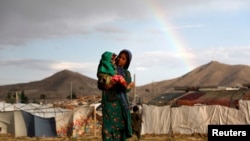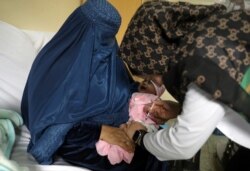With the departure of international troops from Afghanistan, U.N. agencies pledge to remain in the beleaguered country and assist millions of people, many of whom are internally displaced.
The Taliban now is in charge of the country but there is no centralized government in place. U.N. agencies say that is problematic. However, they note they have been talking with the Taliban and other groups for decades about accessing people in need.
Spokesman for the U.N. Office for the Coordination of Humanitarian Affairs Jens Laerke says he believes that experience will allow aid agencies to gain the necessary acceptance to carry out their life-saving operations.
“The armies have left but the U.N. is staying, and we are committed to stay. And that is what we have said from the beginning, and that is what we are doing. Just to remind you that we have already delivered humanitarian aid to some eight million people this year alone. So, I think that is simply a number that demonstrates that we are there to stay.”
The United Nations aims to assist 16 million people this year, including 3.5 million people forcibly uprooted from their homes by conflict. However, it acknowledges that may not be possible as it has received only 39% of its $1.3 billion humanitarian appeal.
The World Health Organization succeeded in flying 12.5 tons of medical supplies into the Mazar-i-Sharif airport in Afghanistan Monday. WHO spokeswoman Margaret Harris says much more is needed.
She says the WHO is planning two further airlifts this week from the WHO’s logistics hub in Dubai and is exploring other options to get more shipments into the country.
She says the WHO is concerned that many non-governmental organizations are forced to scale down operations and close health facilities for lack of money. That, she says, is depriving millions of Afghans of necessary primary and secondary health care.
“The range of services that will be impacted include immunization for children, antenatal care, postnatal care, and child delivery for pregnant women," she said. "Malnutrition care — and COVID treatment centers and other essential services — will also be affected. It is estimated that the closure of every 50 health facilities could lead to the death of five more women and 58 more children under five years of age every day.”
Aid agencies say they fear the tragedy that has been unfolding in Afghanistan will no longer be visible now that the airlifts out of Kabul have ended.
U.N. High Commissioner for Refugees Filippo Grandi warns a far greater humanitarian crisis is just beginning. He is urging nations to keep their borders open to Afghans fleeing persecution and conflict and who need international protection.






